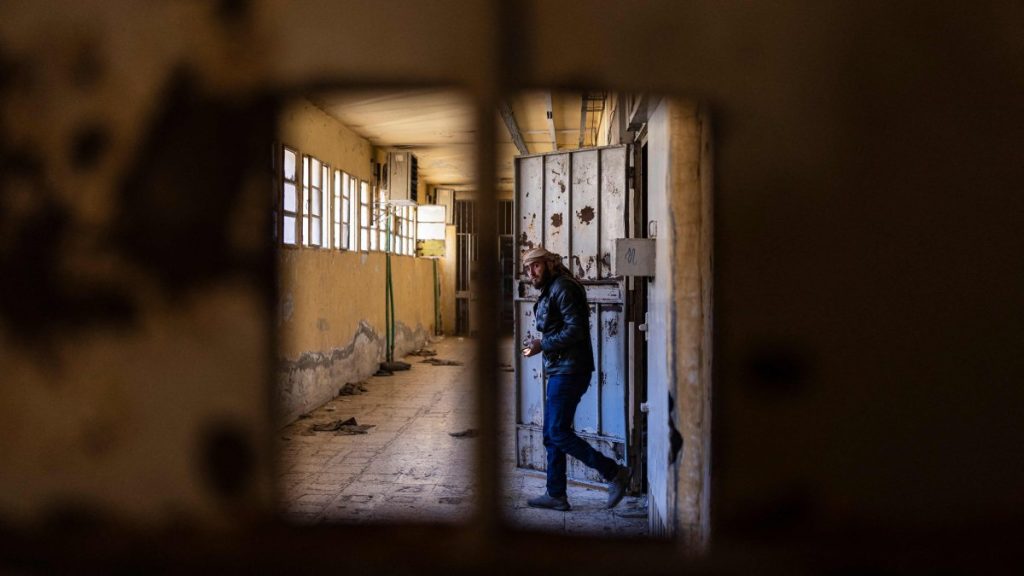A group of Turkish lawmakers will be visiting Syria’s notorious Sednaya prison next week to investigate alleged human rights violations committed under Bashar Assad’s regime.
The Turkish Parliament’s Human Rights Investigations Commission is dispatching a delegation of some 20 people to the prison complex on Dec. 30, commission member and lawmaker Mustafa Alkayış told Anadolu Agency (AA) on Thursday.
“We want to show the world in the clearest way possible how human rights and laws were violated at Sednaya,” Alkayış said. “We aim to ensure a process begins for these people, no matter their faith or sect, whose rights were violated here.”
Located just north of Damascus, Sednaya, the site of extrajudicial executions, torture and forced disappearances, has become a symbol of human rights abuses of the Assad clan, especially since the Syrian civil war erupted in 2011.
Since a lightning anti-regime offensive ended Assad’s rule in Syria almost three weeks ago, tens of thousands of people came to the prison looking for their family members, but only a few dozen detainees were found inside.
The Association of Detainees and Missing Persons of Sednaya Prison (ADMSP) said the anti-regime forces freed more than 4,000 prisoners from Sednaya, which Amnesty International has described as a “human slaughterhouse.”
A crew of Turkish rescuers conducted an in-depth search of the prison complex on Dec. 16.
The regime’s mass executions at Sednaya are revealed in reports, which note that between 2011 and 2015, nearly 50 people were hanged every week, or sometimes every two weeks.
Additionally, the reports show that the regime intentionally kept detainees in inhumane conditions, subjected them to torture, and systematically deprived them of food, water, medicine and medical care.
A 2017 Amnesty International investigation found that murders and torture at Sednaya since 2011 were part of a widespread and systematic attack on Syria’s civilian population, carried out as part of the regime’s policy.
Amnesty International concluded that the violations by the regime’s officials at Sednaya amounted to crimes against humanity.
“Time is passing and evidence is disappearing. We need to see, sort out and archive this evidence to protect the rights (of the prisoners),” Alkayış said.
He stressed that how many people were kept in Sednaya on what grounds and how they were treated “must be put on record.”
According to Alkayış, the delegation will also include representatives of all political parties in Parliament.
The Human Rights and Equality Institution of Türkiye (TIHEK), an equality body and national human rights institution of Türkiye, is separately working to investigate human rights violations in Syria under Assad’s rule.
Speaking to Turkish media on Thursday, TIHEK Chair Muharrem Kılıç said a group of seven experts will document violations at all Syrian prisons, including Sednaya, which will be compiled in a report to be distributed in English and Arabic to raise international awareness.
The report will also offer a source for cases at the International Criminal Court (ICC) and the International Court of Justice (ICJ), Kılıç said.
Preserving evidence
Similarly, three rights groups, including the ADMSP, on Monday appealed to Syria’s new rulers to urgently preserve evidence of atrocities committed under Assad.
Such evidence – including government and intelligence documents as well as mass graves – will be essential for establishing the fate of tens of thousands of people forcibly disappeared and for prosecuting those responsible for crimes under international law, the groups said.
“The transitional Syrian authorities should urgently take steps to secure and preserve evidence of atrocities committed under the government of former president Bashar Assad,” said Amnesty International, Human Rights Watch and the ADMSP.
“Every additional minute of inaction heightens the risk that a family may never discover the fate of their missing loved one, and an official responsible for horrific crimes may never be brought to justice,” Shadi Haroun, ADMSP program manager, said in a statement issued by Amnesty.
The statement said investigators from the three organizations visited detention facilities, mass graves and the military court after Assad was toppled.
“In all of the detention facilities visited, researchers observed that official documents were often left unprotected, with significant portions looted or destroyed,” the groups said.
They said they gathered testimony that security and intelligence personnel burned some material before they fled, but in other cases, the armed groups who took control of the facilities or newly freed prisoners also burned and looted material.
The researchers said they saw ordinary people and journalists “take some documents.”
“These documents may contain vital information,” the watchdogs said, calling on the new authorities to coordinate with fact-finding bodies created by the United Nations “after urgently securing these locations and ensuring that the remaining evidence is not tampered with.”
The rights groups said they also underscored to Syria’s new authorities “the importance of securing the sites of the mass graves across the country,” having seen “local residents and families of the disappeared try to dig up some of the remains.”
They said officials from Syria’s new administration had promised the visiting researchers that they would “strengthen security around key facilities.”
On Sunday, Robert Petit, the visiting head of a U.N. investigative body for Syria, said it was possible to find “more than enough” evidence to convict people of crimes under international law, but there was an immediate need to secure and preserve it.


